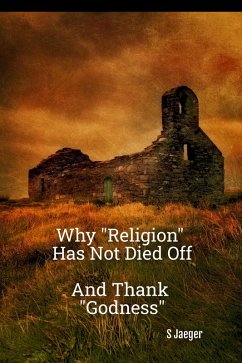This author, 61, puts forth some of his ideas on religion, and what he thinks might be its best aims. In particular, he believes there to be a marked difference between religions and spirituality.
Of particular note to some, would be the last two chapters of this book, which discusses his views on what a "cult" is, and the origins of religious trauma.
He was brought up largely by immigrants from Eastern Europe, and when he was very young, his parents almost became missionaries for the Plymouth Brethren denomination of the Christian faith. Additionally, his maternal grandfather, whom he spent some time with, was born in Ukraine, and was a Mennonite, and his grandmother and mother have been Baptists. His mother is a refugee from World War II, having come to Ellis Island in 1950.
He also has extensively looked into other views such as those of the Native American Indians, and the Buddhists, as well as the quasi-faith of Modern Western Psychology, and the quasi-faith of Money. Also, in his early twenties, he spent a week at the American location of L'Abri, near Boston, Massachussetts, a group originally started by Dr. Francis Schaeffer - a man rcognized internationally for his work in Christianity and culture.
He is also somewhat experienced in psychological views, having spent 150 sessions in psychoanalysis in his twenties, with two MD psychoanalysts: one in San Diego, who once was on a medical school faculty in Kentucky, but later relocated to Manhattan, and then Las Vegas, and the other, a Jewish analyst in San Diego. He has also availed himself of the assistance, later in life, of others, including a psychologist/life coach with a Ph.D., who practiced a more sociological view of the psyche. He sees merit in Cognitive Behavioral Therapy, but recognizes distinct limitations built into this approach, ones where certain core premises have imposed considerable limitations: certain core premises which might focus on promoting what he calls a "contingency-management" approach to life, instead of adding the components of acceptance and tolerance, say: distinctly "spiritual" principles, he believes.
Also, he has spent decades living in the Buckle of the Bible Belt, and has spent time exploring the religion of Appalachia, including the Amish and Mennonites in Kentucky - to include attending services at two Mennonite churches, one by invitation by a Mennonite furniture store friend, as well as looking into the Cherokee Indian faith and leaders in Tennessee and North Carolina, and also spent time in various Navajo regions in Arizona.
Dieser Download kann aus rechtlichen Gründen nur mit Rechnungsadresse in A, B, CY, CZ, D, DK, EW, E, FIN, F, GR, H, IRL, I, LT, L, LR, M, NL, PL, P, R, S, SLO, SK ausgeliefert werden.









